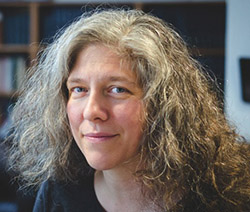Every which way you turn in our culture, youŌĆÖll find representations of sex and love ŌĆö even if youŌĆÖre not necessarily looking for them.
The problem, says Letitia Meynell, is that weŌĆÖre often quite terrible at actually talking about them.
ŌĆ£We have this weird situation in our society where sex is prevalent everywhere in our popular culture, but we donŌĆÖt talk seriously about it,ŌĆØ explains Dr. Meynell, who teaches DalŌĆÖs course on the philosophy of sex and love (PHIL 2170) in the Department of Philosophy.
ŌĆ£The same thing is true about love,ŌĆØ she continues. ŌĆ£There exist in our society these strange ideas about love, like ŌĆśunconditional love.ŌĆÖ Surely every loving relationship is conditional, especially between partners. If someone is physically hurting you, for example, you have good reasons to leave them! You may well stop loving them. We donŌĆÖt really talk about the conditions for a loving relationship, though.ŌĆØ
Questioning assumptions
This is Dr. MeynellŌĆÖs second time teaching the second-year undergrad class, which she inherited from the late Sue Campbell. (ŌĆ£She is really the mastermind behind it,ŌĆØ says Dr. Meynell, ŌĆ£so IŌĆÖm very much influenced by how she taught it.ŌĆØ) The class has about 140 students in it this term and features a broad, wide-ranging syllabus of readings and course material.
 ŌĆ£We start with discussions about sex: what sex is in terms of sexual activity, sex differences, sexual identity, sexual politics. WhatŌĆÖs nice about starting with basic discussions around sex is that when we start talking about love, we have that foundation, because weŌĆÖre talking mostly about erotic love or romantic love, as opposed to something like heavenly love or friendship.ŌĆØ
ŌĆ£We start with discussions about sex: what sex is in terms of sexual activity, sex differences, sexual identity, sexual politics. WhatŌĆÖs nice about starting with basic discussions around sex is that when we start talking about love, we have that foundation, because weŌĆÖre talking mostly about erotic love or romantic love, as opposed to something like heavenly love or friendship.ŌĆØ
The class then concludes with analysis of several topics ranging from marriage, to sex work, to sexual violence.
Dr. Meynell says she hopes students in the class come away with stronger philosophical skills more generally ŌĆö reading carefully, thinking clearly, being able to criticize positions and formulate their own ŌĆö but also an ability and willingness to question their assumptions about sexual relationships and norms, as well as what it means to love and to love well. ┬Ā
ŌĆ£We have this contradictory mindset about love and sex, and itŌĆÖs also very gendered: what women are expected to put up with and how theyŌĆÖre expected to behave can be very different than men, and we donŌĆÖt talk honestly about that.ŌĆØ
What strikes her is the enduring power of tropes and norms about sex and love in spite of evidence and lived experience to the contrary: from the fetishizing of non-consent through ŌĆ£seduction,ŌĆØ to the romantic ideal of marriage as a life-long bond, to the dismissal of sexual assault perpetrated against men due to its perceived emasculation. ┬Ā
ŌĆ£We not only cling to these things that we know, from our experience, are often false, but we presume our experiences are anomalous, and that whatŌĆÖs actually normal and common is still the trope.ŌĆØ
Changing norms
And yet, sexual and romantic norms do evolve and change ŌĆö sometimes, quite rapidly. Dr. Meynell cites attitudes towards homosexuality and differences in sexual orientations more generally as an inspiring sea change: that within a generation, weŌĆÖve gone from a culture where LGBTQ individuals faced widespread prejudice and often violence to one where the popular attitude is that those who engage in hetereosexist or homophobic activities are regressive.
ŌĆ£If weŌĆÖve made this kind of advance in terms of personal freedom and recognition of the many ways to love, what else might we do?" asks Dr. Meynell. "What else needs to be changed, or to be better? LetŌĆÖs try to reimagine more positive sexual relationships and love relationships more generallyŌĆ” If you donŌĆÖt stand back and think about how it might be different, you just accept all those norms.ŌĆØ

